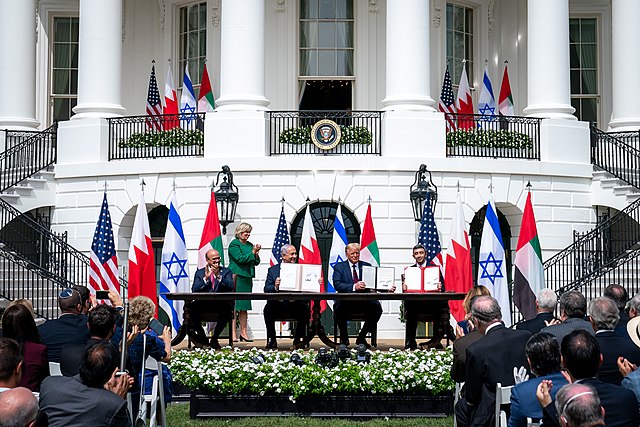First, the good news: Two and half years after entering office, the Biden administration has finally appointed a senior official to focus on advancing the Abraham Accords — the series of landmark deals normalizing relations between Israel and four Arab states that former President Donald Trump brokered in late 2020. The official, Daniel Shapiro, is a well-regarded diplomat and Middle East expert who served as President Barack Obama’s ambassador to Israel.
The not-so-good news? Rather than elevating Shapiro as President Joe Biden’s special envoy, as many in Congress are seeking to do, the administration instead buried Shapiro in the bureaucracy. Secretary of State Antony Blinken announced the appointment via tweet (it apparently didn’t even merit a formal press release). The tweet doesn’t explicitly outline the chain of command, but a press conference that day by a spokesperson made it clear that Shapiro will not report directly to Biden or even to Blinken, but rather to the assistant secretary of state responsible for Middle East affairs — one of the State Department’s six regional bureaus.
That’s a far cry from the fully empowered envoy that Congress has been pushing for. In legislation passed last month by an overwhelming bipartisan majority, the U.S. House of Representatives authorized the creation of a special envoy at the State Department who would be appointed by the president and confirmed by the Senate, report directly to the Secretary of State and be charged with coordinating across the entire U.S. government on issues related to expanding and strengthening the Abraham Accords.
None of those outward markings of bureaucratic heft appear to apply to Shapiro’s job as senior advisor for regional integration. That’s a shame. Not so much because it will prevent Shapiro from making an important contribution. He’s a talented diplomat with deep experience in both Israel and the Arab world. He has strong personal relationships with Biden, Blinken and National Security Advisor Jake Sullivan from their years together in the Obama administration. But his subordinate status in the bureaucratic pecking order will almost certainly make his job more difficult than it otherwise might have been.
It’s also something of a missed opportunity for Biden. There have been lingering doubts about his willingness to invest in what after all was the crowning diplomatic success of his predecessor. Indeed, during Biden’s first months in office, he and his team seemed to go out of their way to squander the diplomatic momentum that Trump bequeathed them. Senior Biden aides called into question the political and military commitments Trump made to underwrite the accords. They pursued a campaign that seemed tailor-made to antagonize the Arab world’s most influential state, Saudi Arabia. And don’t forget the absurd lengths that Biden’s State Department spokesperson went to in the spring of 2021 to avoid even saying the words “Abraham Accords.”
Granted, the administration has made important strides to make up for its early missteps. It established the I2U2 process, a new framework for economic projects that brings India together with Israel, the United Arab Emirates and the United States. In early 2022, the administration helped birth the Negev Forum — a series of ministerial meetings and multilateral working groups where Israel and several of its peace partners hope to tackle pressing common challenges in areas from health care to water to food security. And after several fits and starts, the administration has finally shown signs of getting serious about stabilizing its relations with Saudi Arabia and forging peace between Riyadh and Jerusalem.
Appointing a presidential envoy for the Abraham Accords would have been an important opportunity for Biden to showcase his commitment to build on Trump’s most important diplomatic achievement and lay to rest questions that remain about the priority he places on advancing Arab-Israeli peace. That’s why it was one of the top recommendations we made in a report for the Jewish Institute for National Security of America in January 2022. A presidential envoy would have established a focal point within the U.S. government dedicated to coordinating the wide-ranging activities of multiple agencies involved in the political, economic and security aspects of normalization. It would also have provided an authoritative address in Washington where all those interested in making peace with Israel could go with confidence that they were speaking to someone with the ear of the president and his most senior aides.
There’s still a real chance that Congress could force Biden’s hand on the special envoy position. After Shapiro’s appointment, Senate staff told us that there is bipartisan support in the Senate for legislation like the bill passed by the House. That would have the unfortunate consequence of reinforcing the narrative that Biden’s support for the Abraham Accords has been halfhearted at best and that he’s had to be dragged into taking the necessary measures to seize today’s historic opportunity for Middle East peacemaking.
Ambassador Shapiro is the right man for the job. Now Biden needs to ensure that the job is one that he’s set up for maximum success.
John Hannah is Randi and Charles Wax Senior Fellow at the Jewish Institute for National Security of America. He served as a national security adviser to U.S. Vice President Dick Cheney. Morgan Viña is vice president of government affairs at the Jewish Institute for National Security of America. She previously served as chief of staff to U.S. Permanent Representative to the United Nations Nikki R. Haley.
Originally published in The Hill.

